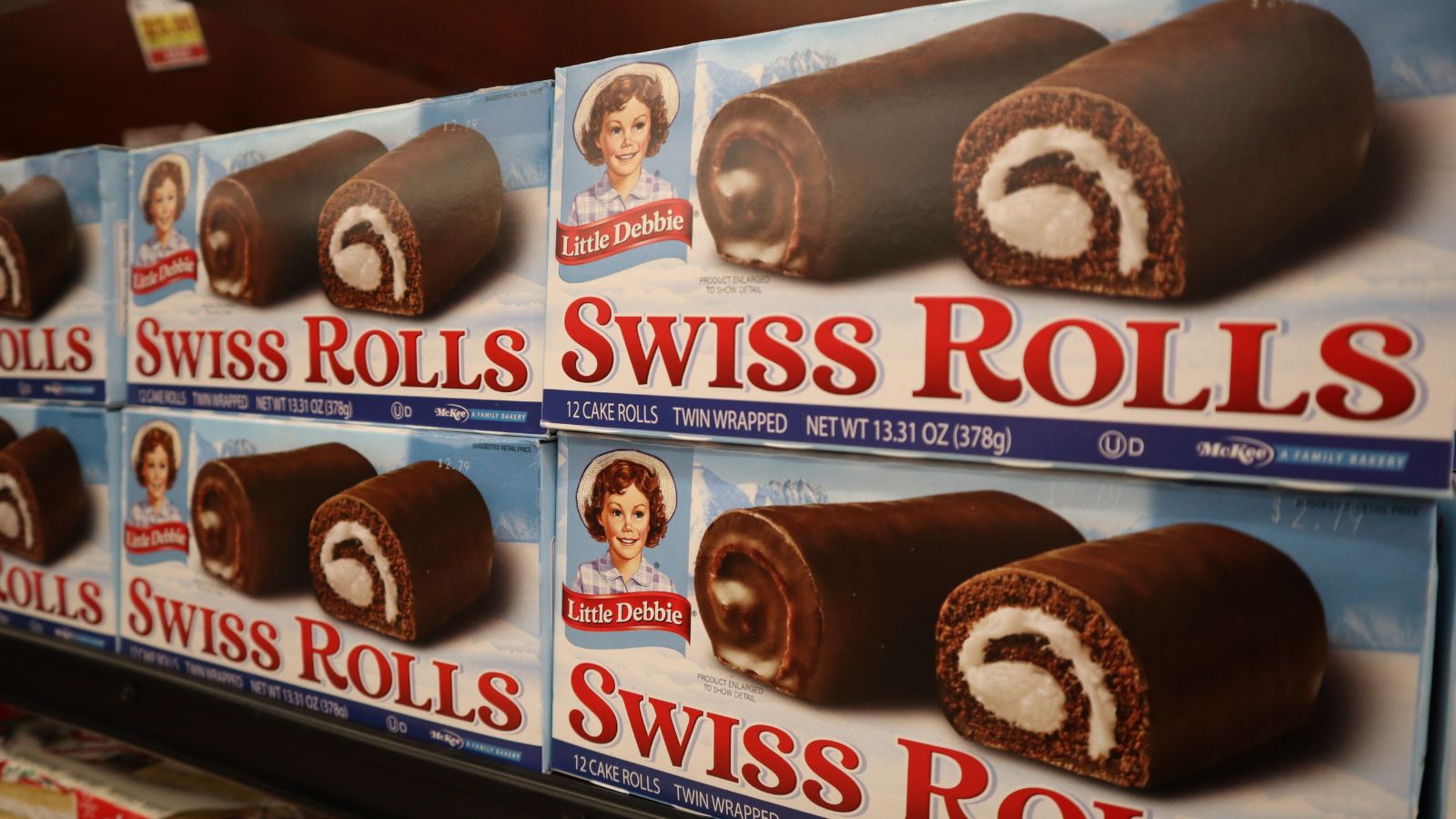We can debate all day about who has the safest food supply in the world. Though, I’d bet you would be surprised at how many everyday American foods are banned in other countries. Most are due to chemical additives and pesticides, which, in places like the EU, cannot be approved for use unless proven safe. Let’s take a look at 19 of them.
Instant Stuffing and Mashed Potatoes

These quick weeknight dinner fixes are designed to make eating at home easier. However, they are banned in the European Union, Japan, and Australia due to the preservative Butylated Hydroxyanisole (BHA), which is suspected to be carcinogenic and impair blood clotting. Thinking about the long-term effects may have you reaching for an actual potato next time the mashed potato craving calls.
Stevia

Used in coffees, desserts, and as a sweetener all across North America and parts of Asia as a ‘healthier’ alternative to sugar. However, it is banned in the EU and UK. There is some evidence that suggests it could contribute to some cancers and male infertility.
Twinkies and Little Debbie Swiss Rolls

American kids find these in their lunch boxes or as a sweet treat when they get home from school, but kids in other countries have little to no access due to health risks. The cake treats have the food dyes Yellow 5 and Red 40 which can cause adverse effects in children. Austria and Norway ban them entirely, while other EU countries have to carry warning labels on the packaging that they are not safe for children, which is the target audience in the U.S.
American Pork

In some countries, like Germany, it is common to eat pork raw. In the U.S., most people would be appalled by the idea. That probably says enough about pork in America, but it is also banned for import into 160 or 196 countries in the world. This is because the American pig farming industry often uses ractopamine, a growth hormone, to fatten up their pigs to the point they can barely use their legs to cut the cost of feed.
Fruit Loops, Frosted Flakes, and Rice Krispies

Fruit Loops, along with several other colorful cereals branded towards children, are banned in France, Austria, Norway, and Finland due to the use of artificial colors. Frosted Flakes and Rice Krispies are banned in several countries due to the use of BHA, which was mentioned previously in this article. Those Cheerios, which contain no dyes or BHA, are looking really tasty right now.
American M&Ms and Skittles

You may have noticed a trend, artificial colors. If you find a bag of M&M’s in Europe, you’ll see red cabbage, lemon, and radish are common coloring agents in this sweet treat. Artificial colors have also been linked to hyperactivity in children. What does this mean for children eating Skittles with their ADHD medicine?
Maraschino Cherries

There was a fun rumor in 2015 that Maraschino cherries were for decorative use only and not for human consumption; this was disproven. However, that doesn’t mean they aren’t banned in Denmark, Belgium, France, and Switzerland for their use of Red No. 40, which is considered safe in the U.S. and the rest of the EU.
Coffee-Mate Coffee Creamer

Trans fats (once common in partially hydrogenated oils) were officially banned in the U.S. in 2018 for their link to heart disease. Somehow, they are still around in products like Coffee-Mate, which many people consume daily. You won’t find Coffee-mate in the refrigerator in European countries that have banned them, including Austria, Denmark, Hungary, Iceland, Norway, and Switzerland.
Chocolate Milk

Before you reach for that pre-made bottle of chocolate milk, check the ingredients to be sure it doesn’t contain carrageenan. This emulsifying agent has been linked to heart disease causing inflammation, Parkinson’s, and Alzheimer’s disease. It is banned for use in baby formula in the U.S. and completely in the EU.
Mountain Dew

Originally created in the 1940s as a mixer for whiskeys, Mountain Dew can be found across the U.S. on dinner tables and in the hands of teenagers. The electric-colored green soda has been banned in over 100 countries for its use of brominated vegetable oil (BVO). BVO competes with iodine for receptor sites in the body, which, along with iodine deficiency, can lead to birth defects, autoimmune diseases, and cancer. It can potentially contribute to skin and nerve problems as well as memory loss.
US Chicken

The EU and the U.S. have been at odds in trade agreements, and chicken has been the source of many disputes. Many in the EU believe chlorinating chicken allows farmers not to keep sanitary conditions for their chickens on the farms. Others, like Adam Smith Institute, which argues in favor of allowing PRTs, believe “immersing poultry meat in chlorine dioxide solution of the strength used in the United States reduces prevalence of salmonella from 14% in controls to 2%. EU chicken samples typically have 15-20% salmonella.”
US Milk

Growth hormones are also a common theme in the U.S. farming industry that does not sit well with other parts of the world. The EU, Australia, New Zealand, Canada, and Israel have banned American dairy due to the use of recombinant bovine growth hormone (rBGH), which has been linked to cancer. Many also find the use of rBGH cruel to dairy cows.
Farmed Salmon

You can find U.S. salmon in other countries, but in Australia and New Zealand, you will only find it if it is wild-caught and not farmed. The ban on farmed salmon is due to the fish being fed astaxanthin instead of natural food, which gives the fish its signature color.
US Apples

An apple a day keeps the doctor away, as the old adage goes. In the EU, there are concerns those apples may send you to the doctor if they come from the U.S. This is because of the use of pesticides along with the chemical-filled wax coating used to make them shiny. Organic apples do not use either of these products, so make the splurge next time you’re at the grocery store.
Gatorade

Gatorade is marketed to athletes, giving it the illusion of being healthy for those who drink it. So it might be surprising to some that the EU has banned it for containing BVO, the same ingredient to blame for Mountain Dew’s ban.
Arby’s Sourdough Breakfast Bread, Croissants, and French Toast Sticks

In case you were unaware, Arby’s has restaurants in Canada, Mexico, Saudi Arabia, Turkey, Egypt, and South Korea. Some popular breakfast items- sourdough breakfast bed, croissants, and French toast sticks- didn’t make the menu. Azodicarbonamide is a dough conditioner and whitening agent, which is the reason for their ban.
US Corn, Soy, and Papaya

We even hear about the dangers of genetically modified organisms (GMO) in the US. These crops in particular, were genetically engineered to be resistant to the ringspot virus and have been banned in the EU and Russia. The modification has been linked to multiple organ damage, massive tumors, birth defects, sterility, and premature death.
Frozen Dinners

Frozen dinners and other products containing azodicarbonamide, (see Arbys) have been banned in Australia, the UK, and most of Europe. It can also be found in breads, boxed pasta mixes, and packaged baked goods. It’s used to bleach flour and foamed plastic, like yoga mats and the soles of sneakers. Yum.
Fat-Free Foods

Olestra is used in many American foods proudly labeled “fat-free”. Olestra is banned in Canada and Europe for its link to gastrointestinal disease in children as well as diarrhea in adults. It can also increase appetite, which can counter the health goals of many of its consumers.
Read More: 17 Things Society Can No Longer Do Because Gen Z Said So

Gen Z, our digital-native, trendsetting generation, is making waves in the cultural sea, steering the ship of societal norms in fresh and unexpected directions. As they charter new territories, there are certain practices they’d rather we say goodbye to. Curious? Let’s take a look at 17 things the rest of us can no longer do because Gen Z said so.
17 Things Society Can No Longer Do Because Gen Z Said So
19 Big Mistakes People Make After Losing a Spouse

Losing a spouse is one of life’s most tragic experiences, and when we’re overwhelmed by grief, we might make some decisions that we’ll later regret. Here are 19 mistakes people make after losing their spouse.
19 Big Mistakes People Make After Losing a Spouse
20 Time-Honored Practices Our Grandparents Followed That We Should Bring Back

Our grandparents had a far simpler life. There was no such thing as social media. Instead, there was more walking and meals were always fresh and homemade. With so many things keeping us busy nowadays, sometimes life would seem much easier if we lived the way our grandparents did.
20 Time-Honored Practices Our Grandparents Followed That We Should Bring Back
19 Common Behaviors of Highly Intelligent People

Intelligent individuals often display a range of behaviors and qualities that set them apart from others. When exploring these characteristics, it’s crucial to comprehend that intelligence is a multifaceted attribute. Here are 19 essential behaviors and qualities frequently observed in highly intelligent people.
19 Common Behaviors of Highly Intelligent People
17 Things We Were Taught in High School That We Now Know Aren’t True

Well, this one may depend on when you went to high school, but for this millennial, these are the things we were taught in high school that have been proven not to be true. Personally, I still want to go back and correct every teacher who told me I wouldn’t always have a calculator in my pocket; the joke is on them.
17 Things We Were Taught in High School That We Now Know Aren’t True
